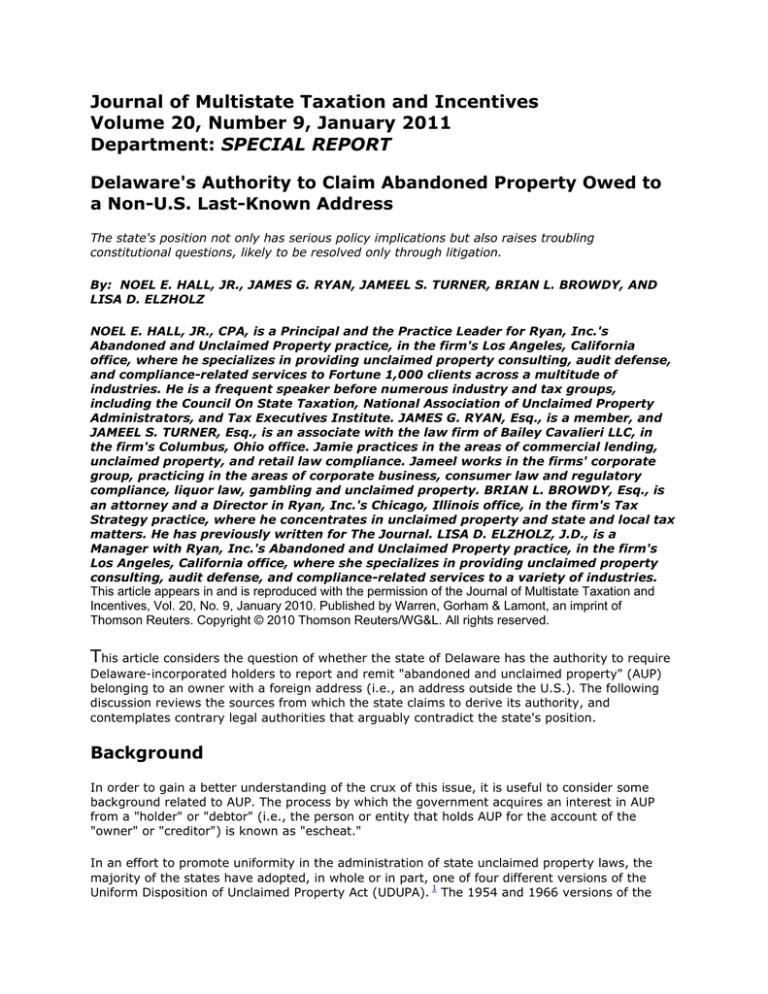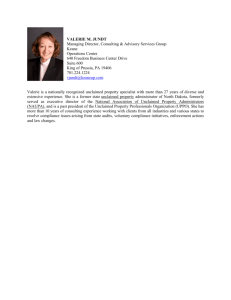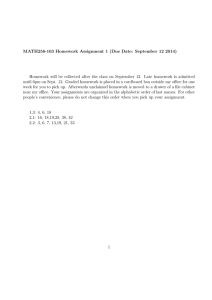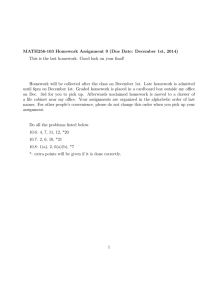
Journal of Multistate Taxation and Incentives
Volume 20, Number 9, January 2011
Department: SPECIAL REPORT
Delaware's Authority to Claim Abandoned Property Owed to
a Non-U.S. Last-Known Address
The state's position not only has serious policy implications but also raises troubling
constitutional questions, likely to be resolved only through litigation.
By: NOEL E. HALL, JR., JAMES G. RYAN, JAMEEL S. TURNER, BRIAN L. BROWDY, AND
LISA D. ELZHOLZ
NOEL E. HALL, JR., CPA, is a Principal and the Practice Leader for Ryan, Inc.'s
Abandoned and Unclaimed Property practice, in the firm's Los Angeles, California
office, where he specializes in providing unclaimed property consulting, audit defense,
and compliance-related services to Fortune 1,000 clients across a multitude of
industries. He is a frequent speaker before numerous industry and tax groups,
including the Council On State Taxation, National Association of Unclaimed Property
Administrators, and Tax Executives Institute. JAMES G. RYAN, Esq., is a member, and
JAMEEL S. TURNER, Esq., is an associate with the law firm of Bailey Cavalieri LLC, in
the firm's Columbus, Ohio office. Jamie practices in the areas of commercial lending,
unclaimed property, and retail law compliance. Jameel works in the firms' corporate
group, practicing in the areas of corporate business, consumer law and regulatory
compliance, liquor law, gambling and unclaimed property. BRIAN L. BROWDY, Esq., is
an attorney and a Director in Ryan, Inc.'s Chicago, Illinois office, in the firm's Tax
Strategy practice, where he concentrates in unclaimed property and state and local tax
matters. He has previously written for The Journal. LISA D. ELZHOLZ, J.D., is a
Manager with Ryan, Inc.'s Abandoned and Unclaimed Property practice, in the firm's
Los Angeles, California office, where she specializes in providing unclaimed property
consulting, audit defense, and compliance-related services to a variety of industries.
This article appears in and is reproduced with the permission of the Journal of Multistate Taxation and
Incentives, Vol. 20, No. 9, January 2010. Published by Warren, Gorham & Lamont, an imprint of
Thomson Reuters. Copyright © 2010 Thomson Reuters/WG&L. All rights reserved.
This article considers the question of whether the state of Delaware has the authority to require
Delaware-incorporated holders to report and remit "abandoned and unclaimed property" (AUP)
belonging to an owner with a foreign address (i.e., an address outside the U.S.). The following
discussion reviews the sources from which the state claims to derive its authority, and
contemplates contrary legal authorities that arguably contradict the state's position.
Background
In order to gain a better understanding of the crux of this issue, it is useful to consider some
background related to AUP. The process by which the government acquires an interest in AUP
from a "holder" or "debtor" (i.e., the person or entity that holds AUP for the account of the
"owner" or "creditor") is known as "escheat."
In an effort to promote uniformity in the administration of state unclaimed property laws, the
majority of the states have adopted, in whole or in part, one of four different versions of the
Uniform Disposition of Unclaimed Property Act (UDUPA). 1 The 1954 and 1966 versions of the
UDUPA make no provision for the disposition of unclaimed property held by a U.S. holder and
owed to an owner with a non-U.S. address; the 1981 and 1995 versions, however, provide that,
with certain exceptions, unclaimed property held by a U.S. holder that is owed to an apparent
owner whose last-known address is in foreign country must be remitted to the custody of the
holder's state of incorporation.
While jurisdictions adopting the most recent versions of the UDUPA thus have express statutory
authority to claim custody of such property, Delaware has not adopted any version of the UDUPA
and has no other statutory basis for claiming such property. Thus, the question becomes: what
legal basis, if any, authorizes Delaware to compel companies incorporated under its laws to
report AUP due and owing to owners outside the U.S.?
It is the author's position that the state's lack of express statutory or common law authority, in
addition to the state's blatant misinterpretation of applicable U.S. Supreme Court cases, calls
into serious question whether Delaware may assert a lawful claim to unclaimed property owed to
a foreign owner.
Lack of Statutory Authority
Similar to most state unclaimed property regimes and the UDUPA, Delaware's Abandoned and
Unclaimed Property Law (AUPL) provides a comprehensive list of property subject to
escheatment, including wages, accounts payable, dividends, stocks, money orders, traveler's
checks, and the like. 2 But that law fails to provide specifically for the escheatment of property
owed to an owner with a non-U.S. last-known address. Although this omission alone may not
prevent the state from claiming a right to such property, the fact remains that there appears to
be a lack of intent on the part of the drafters of the AUPL to subject this type of property to the
statute's reach. Moreover, there is no other statutory reference in the AUPL or otherwise that
lends itself to the inference that property owed to an owner with a non-U.S. last-known address
is subject to the state's custody.
Thus, it is clear that Delaware's official administrative policy to assert jurisdiction over property
owed to an owner with a non-U.S. last-known address derives from sources other than the
Delaware statute. In fact, Delaware unclaimed property officials have acknowledged the absence
of any express statutory basis for the state's position and have instead argued that authority to
escheat unclaimed property owed to foreign owners derives from U.S. Supreme Court case law.
Case Law
Despite the fact that the state of Delaware has not adopted or enacted a law expressly granting
the state the right to escheat property owed to a foreign owner, the state contends that its
authority to make claims for property owed to an owner with a non-U.S. address arises from
federal common law cases governing the issue. But a review of those cases illustrates that the
state's reliance on its interpretations of applicable federal common law cases is tenuous at best.
Texas v. New Jersey, and two "rules of escheat." The landmark case
governing the "priority rules" for AUP claims is Texas v. New Jersey. 3 In that case, the U.S.
Supreme Court considered a dispute among four states claiming the right to escheat uncashed
checks and mineral proceeds that had connections to each state in differing respects. The
Supreme Court settled the dispute by establishing "priority rules" for escheat. In establishing the
"primary rule of escheat," the Court declared that the state with the most superior claim to
unclaimed property is the state of the owner's (i.e., creditor's) last-known address, as shown on
the holder's (i.e., debtor's) books and records. If the owner's address is unknown, or if the state
of the owner's last-known address does not provide for the disposition of the unclaimed property,
the Court stated that such property would be subject to the "secondary rule of escheat," which
provided that the holder's state of incorporation would have a valid claim to the custody of the
property, unless and until another state came forward with a superior claim.
Whether the Supreme Court intended the primary and secondary rules to apply to property
owing to a non-U.S. last-known address is unclear because there is no language in the Court's
decision to suggest that this issue was considered. Notably, the Court's decision in Texas v. New
Jersey was primarily based on creating a rule that would be fair and easy to predict and to
administer. 4 Nevertheless, the Court clearly issued the priority rules with the intent to apply
them to all types of unclaimed property.
Delaware looks to Standard Oil Co. v. New Jersey. Nevertheless, regardless
of whether the Supreme Court considered non-U.S. owners in fashioning the primary and
secondary rules in Texas v. New Jersey, Delaware bases its legal authority to escheat property
owed to non-U.S. owners on an earlier Supreme Court decision. For that authority, Delaware
points to the Court's ruling in Standard Oil Co. v. New Jersey, 5 in which the Court was asked to
decide whether New Jersey, Standard Oil Co.'s state of incorporation, was entitled to escheat
owner-unknown shares of stock and unpaid dividends. The Court answered in the affirmative,
stating that "a state ... may use its legislative power to dispose of property within its reach,
belonging to unknown persons." (Emphasis added.)
Delaware's reliance on this case for apparent authority to escheat property owed to non-U.S.
owners is misplaced for several reasons. First, the Standard Oil decision was based on the
Supreme Court's determination that the state of New Jersey had jurisdiction over both the debtor
and the creditor because the property interests in question arose out of New Jersey's relationship
with the parties. In Standard Oil, the Court's analysis focused on the fact that a state has
jurisdiction over a debtor and creditor when the debtor is domiciled in that state and the creditor
has been provided adequate notice of the existing debt by publication. New Jersey's jurisdiction
over the debtor derived from the fact that Standard Oil was incorporated in the state. Similarly,
the Court determined that New Jersey had jurisdiction over the creditors (i.e., the property
owners) because the state had published, for three successive weeks in a newspaper of general
circulation, a notice regarding their property interests.
While it is significant that Delaware law includes a provision requiring publication of a notice of
unclaimed property to be turned over to the state's custody, the state law does not specifically
address whether property owed to non-U.S. owners is subject to the notice requirement. Further,
any assertion that Delaware has jurisdiction over property owed to an owner with a non-U.S.
address ignores the fact that the state's unclaimed property law does not require holders to
conduct due diligence prior to the escheat of property and does not direct its AUP administrators
to notify an owner of property who has a non-U.S. address. Consequently, although under the
reasoning of Standard Oil, Delaware has jurisdiction over holders domiciled in the state, similarly
it does not have jurisdiction over owners insofar as the state fails to give them notice of their
potential interest in unclaimed property in the state's custody. And without jurisdiction over both
parties whose relationship creates the property rights at issue, the state's reliance on the
reasoning in Standard Oil as a basis for escheatment of property owed to an owner with a nonU.S. address is misplaced.
Second, and more important, Standard Oil involved property belonging to unknown persons. In
Standard Oil, the Supreme Court was not asked, nor did it consider, whether the state of
incorporation was entitled to escheat property held by a domiciliary holder and owed to a known
owner with non-U.S. address. Accordingly, if Standard Oil had involved property with a known
owner, it is likely that the Supreme Court would have opined that adequate notice should have
been provided to non-U.S. owners in order to comport with established standards of due process.
Third, Standard Oil was decided prior to the Supreme Court's establishment of the primary and
secondary rules of escheat in Texas v. New Jersey. In fact, the Supreme Court specifically stated
that Texas v. New Jersey was intended to be the controlling federal common law case concerning
unclaimed property priority issues. Therefore, any conflicts between the Court's decisions in
those cases should be resolved by applying the law of the case decided later in time, i.e., Texas
v. New Jersey.
The So-Called ‘Third Rule of Escheat’
Delaware's position that federal common law authorizes the escheat of property owed to an
owner with a non-U.S. address not only is inconsistent with Standard Oil but also is in conflict
with the priority rules later established in Texas v. New Jersey. In response to that argument,
Delaware contends that Texas v. New Jersey governs only disputes between states over claims
to AUP and does not control disputes between states and holders of AUP. Thus, Delaware's
stance is that the primary and secondary rules of escheat apply only in disputes between the
states; in all other cases, the state of incorporation may take custody of the property until
another state comes forward with a superior claim.
In essence, by asserting jurisdiction over property held by a domiciliary company that is owed to
an owner with a non-U.S. address, Delaware is effectively attempting to apply what is commonly
referred to as the "third rule of escheat." This controversial rule provides that a state may assert
jurisdiction over unclaimed property if the transaction from which the property arose occurred in
that state. Delaware argues that if the unclaimed property in question is held by a domiciliary
company and no other state has come forward to claim the property, Delaware has a right to
escheat the property by default, regardless of whether the property is owed to a known non-U.S.
owner.
Akin to a "most contacts" test, the third rule has never been adopted by federal statutory or
common law and arguably contravenes the Supreme Court's priority rules established in Texas v.
New Jersey. In fact, the following statement by the Court from the Texas v. New Jersey opinion
itself could be interpreted as precluding any argument that the priority rules are jurisdictional:
"The issue before us is not whether a defendant has had sufficient contact with a State to make
him or his property rights subject to the jurisdiction of its courts, a jurisdiction which need not be
exclusive. [Citations omitted.] Since this Court has held ... that the same property cannot
constitutionally be escheated by more than one State, we are faced here with the very different
problem of deciding which State's claim to escheat is superior to all others."
Despite the questionable validity of the third rule, numerous states have adopted a version of
this rule. Remarkably, Delaware is not one of those states.
Foreign Countries With AUP Laws
As noted above, under the secondary rule of escheat established in Texas v. New Jersey, if the
owner's address is unknown or the owner's last-known address is in a jurisdiction that does not
provide for the escheatment of the property at issue, the property escheats to the holder's state
of incorporation. Thus, Delaware can assert jurisdiction over unclaimed property only if the state
of the owner's last-known address does not provide for the disposition of AUP. 6
A noteworthy case on this topic is Riggs National Bank of Washington, D.C. v. District of
Columbia, 7 where the District of Columbia Court of Appeals (D.C.'s highest court) determined
that a condition precedent to application of the secondary rule is that the state of the owner's
last-known address must not have an applicable unclaimed property law. Furthermore, the court
opined that the burden is on the state of incorporation to establish that there is no applicable law
in the state of the owner's last-known-address.
The Riggs opinion provides a logical interpretation of the secondary rule's application. If the U.S.
Supreme Court were to adopt the Riggs opinion, it would provide at least minimal protections for
non-U.S. owners to ensure that states are not taking unfettered advantage of those owners by
asserting jurisdiction over property owing to foreigners without conducting any due diligence.
Additionally, with several foreign countries recently enacting and enforcing their own AUP laws,
more and more foreign jurisdictions likely will be asserting claims to AUP owing to their citizens.
To illustrate, several Canadian Provinces, including Alberta, British Columbia, Prince Edward
Island, and Quebec, have enacted or are in the process of enacting AUP laws. Similarly,
Australia, France, Germany, Hong Kong, Italy, Japan, Kenya, New Zealand, and the United
Kingdom have enacted or are in the process of enacting some form of AUP law.
Thus, asserting jurisdiction over property owed to a non-U.S. owner who lives in a country that
has an established unclaimed property law is likely contrary to the spirit of the secondary rule of
escheat.
Other Considerations
Unclaimed property professionals and other legal experts have opined that state claims to
unclaimed property owed to an owner with a non-U.S. address may violate or conflict with the
federal government's exclusive jurisdiction over foreign relations. 8 If states are permitted to
assert jurisdiction over property owing to a non-U.S. owner, what are the constitutional
implications, if any? If it is proper for the U.S. to enforce its laws against the property of a
resident of a foreign country, is it not just as proper to afford the non-U.S. owner the benefits
and protections of the U.S. Constitution, such as due process (e.g. reasonable notice that the
state has custody of the property, and that, if not claimed, the property will be liquidated)?
On the other hand, should the U.S. even have any authority at all to assert its laws over the
nonresident? Is it not more logical that the laws of the country where the owner resides should
govern the disposition of unclaimed property owed to its residents? These types of conflict-of-law
issues have traditionally been governed by the international principle of "comity." Comity, as
applied in the unclaimed property arena, may provide a reliable legal basis to argue that U.S. law
should never apply to property owed to non-U.S. residents.
The International Law Principle of Comity
In the U.S., the foundation of private international law is the principle of comity. This principle
traditionally has been understood to mean that all sovereign states should "apply foreign law or
limit domestic jurisdiction out of respect for foreign sovereignty." 9 This requires each jurisdiction
to "balance competing public and private interests in a manner that takes into account any
conflict between the public policies of the domestic and foreign sovereigns." 10 In most contexts,
comity is effective as long as foreign laws or judgments do not directly conflict with the forum
country's public policy or discriminate against citizens or legal entities of another country.
U.S. Supreme Court precedent on this issue has stated that comity "was not intended ... to give
to the laws of one State any operation in other States. They can have no such operation, except
by the permission, express or implied, of those States." 11 In other words, forum countries have
no authority to assert their laws in a foreign country, unless the foreign country agrees that the
law of the forum country should apply. At this time, there is no treaty or other agreement in
force with any foreign country that directly addresses a U.S. state's ability to assert jurisdiction
over property owed to non-U.S. residents, which has permitted Delaware to make its dubious
claim to property owed to an owner with a non-U.S. address under the guise of state law.
Comity requires a balancing of interests of the respective forums and of international policy.
Even when there is a true conflict with the laws of a foreign nation, U.S. courts will not yield in
the name of comity if doing so conflicts with the law or policy of the U.S. 12 But even though the
several states have the ability to regulate certain activities within their borders, state laws must
give way to the effective exercise of the federal government's foreign policy where there is a
conflict.
Although courts in the U.S. have long recognized the principle of international comity and have
advocated the principle in order to promote cooperation and reciprocity with foreign lands,
comity remains a rule of practice, convenience, and expediency, rather than a rule of law. 13
Therefore, where the law of a foreign jurisdiction does not conflict with the laws of the state, the
law of the foreign jurisdiction should be applied. U.S. courts regularly invoke the doctrine in
conflicts involving U.S. citizens and foreign governments.
Where the application of a state law to a U.S. company doing business in a foreign jurisdiction
would run the risk of that company's violating the law of the foreign jurisdiction, the state law
must yield to the foreign jurisdiction's law. The principle of comity is clearly applicable in
jurisdictions such as Quebec, where unclaimed property must be reported if the transaction
generating it occurred there. While there is no case law on point, it is likely that federal common
law in the form of the secondary rule would yield to such a law, because the foreign country
would have a better likelihood of returning the property to the true owner. Because the doctrine
of comity has yet to be applied in a dispute over unclaimed property owed to a non-U.S.
resident, it is difficult to determine how comity would be applied in a dispute over a state's
attempt to collect foreign unclaimed property.
Nevertheless, what is clear is that Delaware's assertion of jurisdiction over property owed to a
non-U.S. owner directly violates the principle of comity because Delaware's AUP law does not
provide non-U.S. residents due process prior to the deprivation of their property. If the U.S.
holds non-U.S. residents subject to U.S. laws, U.S. states must arguably afford the non-U.S.
residents the protection of U.S. laws as well (e.g., due process).
Providing notice: the Vondjidis case. One could reasonably argue that providing
notice to individuals who are outside the U.S. and unaware of the U.S.'s unclaimed property laws
should be a condition precedent when the foreign individual's property has reached the full
period of dormancy and would be transferred for custody to the state where the holder is
incorporated. Although the state of Delaware has an indemnification clause purportedly
protecting holders that transfer AUP to the state each year, holders may not be completely off
the hook. Delaware may claim that the holder is not entitled to indemnification based upon a
technicality, similar to the outcome in Vondjidis v. Hewlett Packard Corporation. 14
In that case, Hewlett Packard (HP), a California corporation, transferred into the custody of the
state of California unclaimed property in the form of shares of HP stock that had been owned
through an employee stock purchase plan by Alexander Vondjidis. Vondjidis was a former HP
employee who had worked at HP's office in Athens, Greece, his last-known address and the
country where he resided.
Prior to the transfer, Hewlett Packard failed to provide any type of notice to the shareholder. The
company attempted to claim immunity under California's indemnification clause; however,
Vondjidis disputed indemnification by asserting that Hewlett Packard failed to follow the state's
AUP law, which required that holders conduct due diligence prior to transferring AUP to the state.
The California Court of Appeal agreed with Vondjidis and held Hewlett Packard liable for the non-
U.S. shareholder's damages because the company failed to properly notify the non-U.S.
shareholder prior to the transfer of the property to the state.
As noted above, it is without question that the state of Delaware does not require holders to
conduct due diligence or perform any other form of notice prior to taking custody of presumed
AUP owed to residents of foreign countries. Nevertheless, under the principle of comity, there is
a strong argument that, under federal law, adequate notice to the owner of the property would
be required prior to escheat.
Moreover, consider the implications of how the principle of comity may be violated by Delaware's
use, for the state's general welfare, of property owed to a known resident of a foreign nation.
Conclusion
In summary, there is no basis in Delaware statutory or common law for the lawful escheat of
property due and owing to non-U.S. owners. In the acknowledged absence of any express
statutory authority, Delaware instead bases its position on a flawed interpretation of outdated
federal jurisprudence. The state's position not only has serious policy implications but also raises
troubling constitutional questions, likely to be resolved only through litigation. 15 []
Sidebar
Practice Note: A State Supreme Court Weighs in on "Notice"
As discussed in the accompanying article, in Vondjidis v. Hewlett Packard Corporation 85 Cal Rptr
3d 806 , 2008 WL 4988915 (Cal. Ct. App. 6th Dist., 2008), rev. granted and opn. superseded 90
Cal. Rptr. 3d 344 , 202 P3d 427 (2009), rev. dismissed, cause remanded 100 Cal. Rptr. 3d 447 ,
217 P3d 816 (2009), the California Court of Appeal held that a holder (Hewlett Packard) of
"abandoned" property (i.e., shares of stock) was liable for damages to the non-U.S. owner of the
property because the holder failed to properly notify the owner prior to transferring the shares to
the state.
The California Supreme Court initially granted the petition for review in Vondjidis but deferred
briefing, pending its consideration of a related issue in another case. It subsequently dismissed
that request for review upon its issuing a decision in that other case, Azure Ltd. v. I-Flow
Corporation, 46 Cal.4th 1323, 96 Cal. Rptr. 3d 501 , 210 P3d 1110 (2009), aff'g 163 Cal. App.
4th 303 , 77 Cal Rptr 3d 463 , 2008 WL 2173870 (4th Dist., 2008). In Azure, the high court held
that a holder was immune from liability for the sale of "abandoned" stock only to the extent that
it complied with notice provisions of the unclaimed property law.
NOTES
1
The original version of the UDUPA was drafted in 1954. Revisions were drafted in 1966, 1981,
and 1995. Such "uniform acts" are a set of proposed laws intended to provide the states with
rules and procedures that are consistent from state to state. While they are offered to the states
for incorporation into their own statutes, a state may reject an entire act, or adopt it in whole or
in part or with modifications. These acts (and similar acts dealing with other areas of state law)
are developed and drafted by the National Conference of Commissioners on Uniform State Laws
(NCCUSL), a nonprofit, unincorporated association created in 1892 and comprised of more than
300 "uniform law commissioners," all members of the bar qualified to practice law. The
commissioners are practicing lawyers, judges, law professors, and legislators who are appointed
by the states (as well as by the District of Columbia, Puerto Rico, and the U.S. Virgin Islands) to
draft proposals for uniform and model laws on subjects where state uniformity is desirable and
practicable, and they work toward enactment of those models by the state legislatures. See the
NCCUSL website at www.nccusl.org.
2
12 Del. Code Ann. §1198(11).
3
379 US 674 , 13 L Ed 2d 596 (1965).
4
"We believe that the rule we adopt is the fairest, is easy to apply, and in the long run will be
the most generally acceptable to all the States." Texas v. New Jersey, supra note 3.
5
341 US 428 , 95 L Ed 1078 (1951).
6
See Texas v. New Jersey, supra note 3, page 682.
7
581 A2d 1229 (D.C., 1990).
8
Under the Commerce Clause (U.S. Const., Art. I, §8, Cl. 3), "[t]he Congress shall have Power
... [t]o regulate Commerce with foreign Nations, and among the several States...." For more on
this area, see, e.g., Rhines, Sutton, and Yesnowitz, "When Does the Federal Foreign Commerce
Clause Restrict State Taxation?," 16 J. Multistate Tax’n 6 (August 2006) ; Young, "Challenging
State and Local Taxes on Constitutional Grounds," 10 J. Multistate Tax’n 12 (July 2000).
9
Janis, An Introduction to International Law (4th ed., Aspen Publishers, 2003), page 327.
10
Paul, "The Transformation of International Comity," 71 Law & Contemp. Probs. 19 (Summer
2008) (available online via the Duke University School of Law website at
www.law.duke.edu/journals/lcp; select "Issues" and click on "Archive").
11
Paul v. Virginia, 75 US 168 , 19 L Ed 357 (1868) (discussing the privileges and immunities
clause, U.S. Const., Art. IV, §2).
12
U.S. v. Portrait of Wally, A Painting By Egon Schiele, DC N.Y., No. 99 CIV. 9940 (MBM),
4/12/02, 2002 WL 553532.
13
Northstar Diamond, Inc. v. Azran, DC Minn., No. CIV.04-3279 RHK/JSM, 11/30/04, 2004 WL
2757910.
14
85 Cal Rptr 3d 806 , 2008 WL 4988915 (Cal. Ct. App. 6th Dist., 2008) rev'g Cal. Super. Ct.,
Trial Div., No. 1-03-CV-815388, 8/28/06, 2006 WL 5536083 , rev. granted and opn. superseded
90 Cal. Rptr. 3d 344 , 202 P3d 427 (2009), rev. dismissed, cause remanded 100 Cal. Rptr. 3d
447 , 217 P3d 816 (2009). For background and more analysis on Vondjidis, see Green-Kelly,
"Complying With Unclaimed Property Laws: Two Decisions Add Burdens, Create Uncertainties,"
19 J. Multistate Tax’n 34 (July 2009).
15
For more on escheat generally, see Sangiuliano, "Unclaimed Property: An Overlooked Area of
Responsibility for Tax Practitioners," 16 J. Multistate Tax’n 20 (October 2006) ; Peters and
Beintum, "Going Fishing: State Budget Deficits Drive an Expanding Net of Unclaimed Property
Collections," 19 J. Multistate Tax’n 26 (July 2009) ; Shop Talk, "Enforcement Trends in
Unclaimed Property: What Companies Need to Know," 19 J. Multistate Tax’n 34 (February 2010).
END OF DOCUMENT - © 2011 Thomson Reuters/RIA. All rights reserved.




